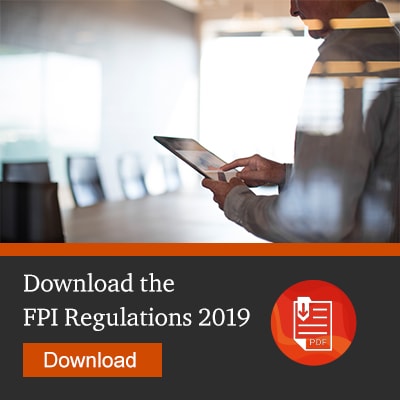
New framework for Foreign Portfolio Investors (India)
In brief
The Government of India, through the Securities and Exchange Board of India (‘SEBI’), has been taking measures to liberalise its current Foreign Portfolio Investors (‘FPIs’) regime through simplified operational and compliance requirements to boost foreign investment into India. The SEBI has recently issued the Operational Guidelines on 05 November 2019 for FPIs, Designated Depository Participants and eligible foreign investors to facilitate the implementation of the new SEBI (Foreign Portfolio Investors) Regulations, 2019.
With these new Operational Guidelines, the existing circulars, FAQs, operating guidelines, and other guidance issued by SEBI are no longer applicable.
Related content: Overview of current FPI Regime, FPI Regime simplified by the SEBI
New framework for Foreign Portfolio Investors investing in India
The Securities and Exchange Board of India (SEBI) has, on 23 September 2019, notified SEBI (Foreign Portfolio Investors) Regulations, 2019, thereby repealing the SEBI (Foreign Portfolio Investors) Regulations, 2014.
SEBI has also issued Operational Guidelines for Foreign Portfolio Investors (‘FPIs’), Designated Depository Participants and eligible foreign investors on 5 November 2019, to facilitate the implementation of the new SEBI FPI Regulations, 2019. With these new Operational Guidelines, the existing circulars, FAQs, operating guidelines, and other guidance issued by SEBI (as listed in Annexure-A to the Operational Guidelines) are no longer applicable.
The new SEBI FPI Regulations, 2019 and Operational Guidelines primarily aim to ease the registration process, eliminate redundant regulatory conditions and lessen the compliance requirements for FPIs.
Key impact on Mauritius Funds
- Since Mauritius is not a member of the Financial Action Task Force (‘FATF’), funds from Mauritius may not be eligible to obtain registration as a Category I FPI, except as discussed below;
- Funds can obtain Category I FPI registration under the following two situations:
- There is at least 75% direct or indirect ownership by an entity eligible to obtain Category I FPI registration; or
- The funds have a regulated investment manager (an FATF member country) and is registered as a non-investing Category I FPI.
- Broad based condition is no longer required to be satisfied for a fund to be characterised as a Category I FPI.
- Category II FPIs are not allowed to issue/invest in Offshore Derivative Instruments.
- There could be additional KYC compliances for funds which were Category II under the previous SEBI FPI Regulations, 2014 and which continue to be Category II under the new SEBI FPI Regulations, 2019.
How can we help?
In case you are investing into India under the FPI route or are interested to invest in India, we can help and assist you in the following:
At the time of set-up
- Conceptualisation and implementation of structure for the purpose of investing in India; and
- Obtaining the Permanent Account Number (PAN) in India (i.e. tax identification number) and FPI registration with the SEBI.
On-going compliance and advisory services
- Compliance services such as determination of tax liability for repatriation purposes, assistance in preparation of annual income-tax return and assistance in tax audit with the Indian tax authorities;
- Providing customised reports as per the requirements of the funds; and
- Any other tax or regulatory advice, which may be required by the funds.
Watch the FPI related webcasts
Subscribe to watch the FPI focused webcast during India's Union Budget 2019, and more.

Indian Budget 2019 – Impact on foreign investors & multinational companies
Date: Tuesday, 9 July 2019 | Time: 11:00am – 12:00pm ET





















